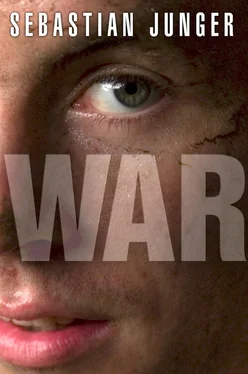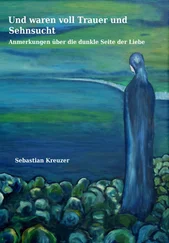If humor wasn’t enough to get you through the week you could always talk about the exploits of the men on leave. By mid-tour there was a steady trickle of men coming and going, and the things that happened to them provided a minor amount of spiritual sustenance for the others. Leave lasts eighteen days and starts when your feet touch American soil. It seems to consist mostly of getting drunk with friends and trying to meet, impress, and seduce women who won’t care that the association will be measured in days, if not hours. When Pemble went home on leave he had to change planes in Texas, and as he was walking through the first-class section on his flight to Oregon a man jumped up, grabbed Pemble’s boarding pass, and told him they were trading seats. Pemble’s uniform was ripped and filthy, and he sat in first class for the first time in his life reeking of combat and drinking champagne. He took a commuter train from the airport to Beaverton and walked into a Hooters restaurant and ordered a beer. The waitress saw him in his uniform and sat down next to him and started asking questions. At one point she wanted to know what he’d done to get his combat infantry badge.
‘I just had to get shot at,’ Pemble answered.
Her next question was whether or not he had a girlfriend.
Pemble’s parents didn’t know he was coming home on leave — he wanted to surprise them — so he walked several miles from the train station with an assault pack over his shoulder and people staring at him as they drove by. His parents were both at work and the house was locked so he got a ladder out of the garage, put it to a second-story window, and climbed in. After a while he got bored sitting home alone so he went out and knocked at the house of a Vietnam vet who lived next door. The vet understood without having to ask and pulled some whiskey out of the cabinet and they spent the rest of the afternoon drinking. When Pemble’s parents finally came home he was asleep on their couch, filthy and exhausted and drunk.
Everyone reacts differently to going home. The first time Hijar sat down to a hot meal he burst into tears. Cortez didn’t know whether he should act like a man or a boy when he saw his mom at the airport, but it didn’t matter because it was his brother-in-law who picked him up and they just went out and got drunk. Jones thought the rattling of the pipes when he ran the water sounded just like the .50 and stood there listening to it for so long that his wife finally asked what was wrong. Everyone jerked at loud noises and dreamed about combat, and everyone worried about their brothers back in the Korengal. It was the kind of combat where one man could make all the difference, but you couldn’t be that man if you were home partying with your friends.
And then there were the questions. Moreno went home to Beeville, Texas, and got into a conversation with a stranger who finally asked what he’d wanted to ask all along, which was whether Moreno had killed anyone. Moreno just looked at him. “Keep in mind I’ve never met this guy,” Moreno said. “I’m like, ‘Yo, we don’t like talking about that.’ And he was like, ‘If I killed someone I’d let you know.’ His eyes were rolling toward the back of his head and this and that and I was like, ‘Dude, it’s different when you see your best friend laying there dead. You think you’re a badass until you’ve seen a fallen soldier laying there not breathing anymore and then it’s a different fucking story.’”
Moreno thought of leave primarily as eighteen days when he didn’t have to worry about getting shot. He was one of those rare things, a good soldier who didn’t like combat, and as far as he was concerned if they never got into another firefight it was fine with him. Once we got hit pretty hard and an RPG came in and exploded against the sandbags right next to where Moreno was standing. There were only a few weeks to go in the deployment and Moreno dropped into a hole and came back up shaking his head in disgust. Meanwhile Steiner was running around with a big grin on his face. “It’s like crack,” he yelled, “you can’t get a better high.” I asked him how he was ever going to go back to civilian life.
He shook his head. “I have no idea.”
THE MISSION EVERYONE’S BEEN GETTING NERVOUS about is Karingal. They’ve never gone there without getting shot at and the fact that there hasn’t been a TIC in weeks only means the enemy has saved up plenty of ammo. Karingal is only a few clicks south of Loy Kalay but the approach is wide open to enemy positions on 1705 and the inhabitants are hard-core Taliban — the guys say they can tell by the looks in their eyes. The town’s only saving grace is that there’s supposed to be one very beautiful girl there, Moreno caught a glimpse of her once (right before they got lit up from the south). Otherwise all the hot girls are in Upper Obenau.
Patrols never leave at the same time or follow the same routes, and the mission to Karingal is set for midafternoon with the sun just starting to throw cold blue shadows across the valley. We leave the wire through the southern gate and contour across the draw, moving quickly through the open spots and only stopping behind trees so the patrol is harder to spot. You never walk up on the man in front of you because clusters get targeted, and you never speak over a whisper. If you step carelessly and knock stones down the slope, heads turn and men stare. We cross over the high road and continue southward into a pretty little valley above a creek slotted deeply into a draw. The creek comes down from the high peaks muttering between boulders and over rock shelves and we have to walk way up the valley before we can cross over and double back on the other side. Snow is lying deep in the northern exposures and melting busily on the south-facing slopes as if winter weren’t happening there, and if you stopped to feel the sun on your face, you could imagine the war wasn’t either.
We exit the draw somewhere north of Karingal and move quickly down the road, boots crunching double-time in the snow and the men silent and tense. The sounds of village life rise to meet us, children shouting and the cry of a baby and once in a while a rooster or the patient agonies of livestock. We’re moving on the village single file as fast as we can and sweating heavily in our body armor, trying to get close before the local men can get up to their fighting positions. Gillespie pauses briefly before turning the ridgeline outside town and we start down the last stretch with 1705 looming above us like the hull of a huge gray battleship. No cover except six inches of frozen mud if you squeezed yourself down into the tire ruts in the road.
The village has gone silent now except for one dog, then another furiously baying our arrival. We clamber down the final slope into town to find every door closed and every window shuttered tight. I follow O’Byrne to the edge of the village and he takes up a position behind some trees and watches the ridgeline to our south. That’s where it will come from if it comes at all. A family is clustered on the back porch of a house, children crying and a woman trying to pull everyone indoors. A chicken wanders through it all pecking the ground. A mortar booms in the distance, something must be going on up-valley. O’Byrne spots an old man moving fast through the lower village hoping we won’t see him and O’Byrne shouts and the old man looks up and nods and starts making his way toward us. He’s using an ax as a walking stick and moves impossibly fast up the steep slopes. He must be at least sixty, and moments after O’Byrne calls to him he’s standing before us not even breathing hard. An Afghan soldier relieves him of his ax. Through an interpreter the man says he’s visiting from Yaka Chine because his son has a wounded leg. Gillespie tells him to take us there and we start off through the village doing our best to keep up with him.
Читать дальше
Конец ознакомительного отрывка
Купить книгу












